

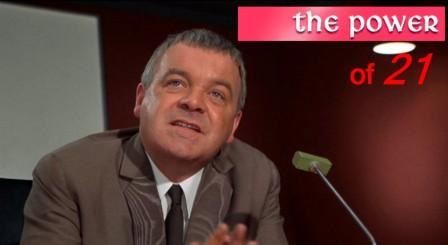
The Plane Makers and The Power Game. were among Gerry and Sylvia Anderson’s favourite TV programmes - Patrick Wymark was cast in their movie Doppelganger as a "21st Century John Wilder.” How much influence did the world of Wilder have on the World of Century 21?
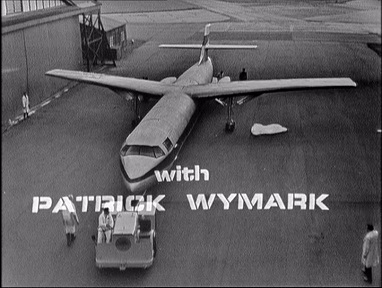
In the second series of “The Plane Makers”, the title sequence showed a tug hauling a full size mock up of the prototype Sovereign SF200 airliner from the runway into the hangars to the sound of Trevor Duncan’s powerful and stately “Citizens of the World” march.
When Gerry and Sylvia Anderson launched their 1965 TV series, “Thunderbirds”, they asked Barry Gray to compose an equally stirring march for the title sequence introducing the puppet stars.
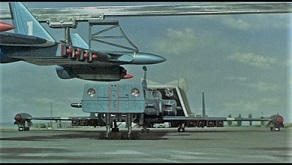
When the TV series was spun off into the movie “Thunderbirds Are Go” (1966), Barry Gray created an equally dramatic theme to accompany a sequence showing the assembly of the Zero X spaceship. It echoes the Plane Makers titles, with the hangar rolling back, and Zero X moving out to assemble on the runway.
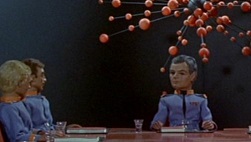
Following the sabotage of Zero X we see a board-room sequence presided over by a testy character looking very much like Patrick Wymark. The character is voiced as an American by Jeremy Wilkin, but the situation is reminiscent of one of Wilder's board room spats when one delegate refuses to endorse a second Mars mission by a rebuilt Zero-X unless it has security provided by International Rescue.
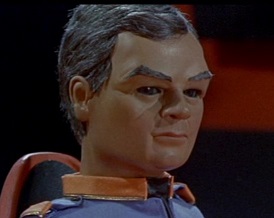
Intriguingly, Anderson’s next series, “Captain Scarlet and the Mysterons” (1967) opened with a Zero-X mission to Mars. One of Anderson’s pre-production ideas (later dropped) was to have a “guest puppet” in each episode, sculpted to look like the actor who provided the voice. Although this idea was quickly dropped, perhaps it was inspired by the “Wilder puppet” in “Thunderbirds Are Go”.
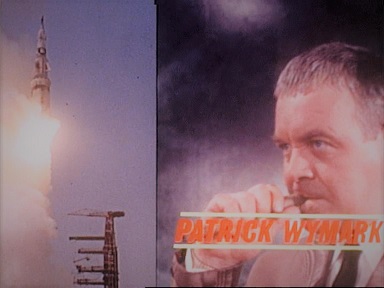
In 1968, Gerry Anderson produced Doppelganger (aka Journey to the Far Side of the Sun), which enabled him to cast the real Patrick Wymark as Jason Webb. Perhaps because Century 21 was owned by ATV, there was no attempt to disguise the resemblance to Wilder -the film's publicity describes Webb as “John Wilder(2069 model)”. The film is covered in more detail on our Doppelganger page.
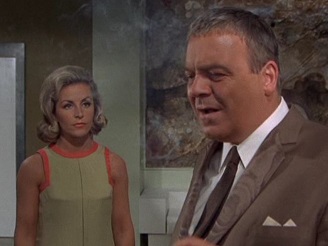
George Sewell (who had played Frank Hagadan, Wilder’s love rival in “The Power Game”)was cast as Eurosec's lethal security chief. More significantly, Anderson also cast Norma Ronald as Webb’s secretary Pam Kirby. Ronald had already played the immaculate and organised Kay Lingard in “The Plane Makers” and “The Power Game”. Apart from bleaching her hair blond, the character and relationship to Webb was very much the same as Wiler and Lingard.
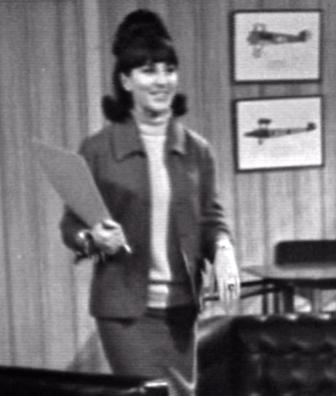
Despite the plot being focussed on the space exploration story, the Andersons’ did manage to retain a couple of scenes showing Wymark squeezing funding out of his reluctant backers. Webb’s methods are even more ruthless than Wilder’s, but Wymark delivers a strong central performance.
“Nobody joins me conditionally. You join me in ignorance or not at all.” John Wilder
Unfortunately, Doppelganger (or Journey To The Far Side Of The Sun) failed at the box office. However, Anderson carried many of the concepts and designs into his next TV series, UFO. The Anderson’s first live action TV show was about the fight to protect Earth from alien invaders. Earth was defended by a secret organisation called SHADO which operated literally beneath the guise of a film studio. The administration building of Harlington-Straker was actually that of ATV – the complex had also stood in for the EUROSEC headquarters in "Doppelganger" but had featured extensively as the offices of the Scott-Furlong aircraft factory in “The Plane Makers”.
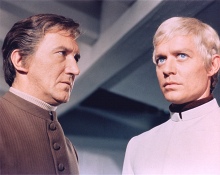
Both Ed Bishop, who had played the NASA liaison in Doppelganger and George Sewell who had played Eurosec's security chief, starred in UFO. While, Sewell's introduction in the first minutes of the first episode of UFO might seem a little unusual to contemporary eyes (a combination of Napoleon Solo and Sid James), for those viewers who first encountered Sewell as Alec Freeman he seems 100% authentic. In many of the early UFO episodes, Sewell provides the humanistic counterpoint just as Jack Watling's Don Henderson often provided a muted moral reaction to Wilder's single-minded strategies. Ian Fryer notes** that,"In The Power Game (Sewell) spends most of the first two series romancing Lady Wilder..(and that this) gives some clue into the thinking of the Andersons in casting him in UFO"
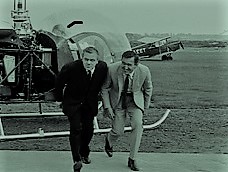
Patrick Wymark as Wilder with George Sewell as Hagadan in The Power Game.
Bishop was cast as Commander Ed Straker of SHADO. A former USAF Colonel, Straker has elements of Brigadier General Savage, the character played by Gregory Peck in “Twelve O’Clock High” who rebuilds the morale of a Bomber Group through “tough love”.
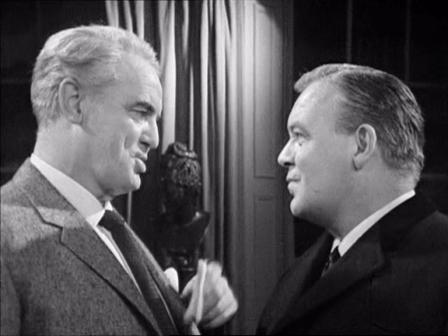
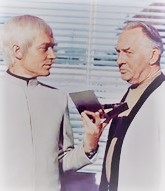
The cycle of conflict between Bligh (Clifford Evans) and Wilder was repeated in UFO by Henderson (Grant Taylor) and Straker
However, there are also echoes of ”The Plane Makers”. Straker’s antagonistic relationship with General Henderson, whose International Astrophysical Commission controls SHADO’s budget recalls the conflict between Sir John Wilder and bank chairman Sir Gordon Revidge. Grant Taylor’s aggressive performance as Henderson is also reminiscent of Clifford Evans as the domineering Caswell Bligh in “The Power Game.” In the final series of "The Power Game", broadcast just before "UFO" started production, Caswell Bligh was now a Government Minister who recruited Wilder as a Special Envoy before then trying to undermine him. In UFO, Straker and Henderson are initially allies in the fight against UFO's, but "Confetti Check-AOK" reveals that Straker was promoted to the command Henderson expected. Chris Bentley* observes that the stress of balancing SHADO's budget has made Henderson, "bitter and resentful of Straker's position." Chris Drake observes # that "Henderson...misses no opportunity to discredit Straker or remind him that it is he who is holding the purse strings." Ian Fryer** notes that in the aptly named episode 'Conflict', "Actors Ed Bishop and Grant Taylor really tear into Ruric Powell's script, striking sparks off each other.."
Although Ed Straker developed into an action hero towards the end of the series, the original concept had been for Straker to be more like Wilder as the man behind the desk issuing orders. One area where “UFO” went further than “The Power Game” was in the episodes “Confetti Check-AOK” and “A Question of Priorities”, which showed the break-up of Straker’s marriage and the death of his son (the Wilder’s son was effectively written out of continuity after “The Plane Makers”).
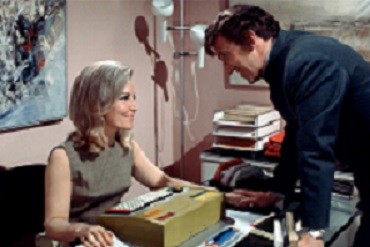
George Sewell played the Napoleon Solo-like Alec Freeman in UFO, while Norma Ronald played Straker’s secretary Miss Ealand.
As Miss Ealand, Norma Ronald retained her blonde-look fromm Doppelganger, and had a slightly less formal manner than Miss Lingard. But just as Kay Lingard was the keeper of Wilder’s personal secrets (booking travel for his mistresses and checking his clothes when Lady Wilder leaves him) – Miss Ealand is the literal gate-keeper of Straker’s secret life, guarding the concealed entrance to SHADO headquarters.
Sadly, work on BBC Radio 4's "Doctor in the House" meant that Ronald had been unable to return as Miss Lingard in the final 1969 series of The Power Game. Ironically, she was replaced in three episodes by Deborah (The Psychobombs) Grant as Wilder's secretary Jill.
One other connection with “The Plane Makers” is that the “UFO” episode “A Question of Priorities” echoes the titles of the “Plane Makers” episodes, “A Question of Sources” and “A Matter of Priorities” although there is no resemblance to the actual plots. This is, however, one of the episodes which explores the break-up of Straker's marriage while also borrowing a story element from the life of film producer Alexander Korda (Korda arranged the flight of a life-saving drug from America for the son of a technician, with happier consequences than in the UFO episode).
* The Complete book of Gerry Anderson's UFO, Chris Bentley 2003
# UFO - SPACE 1999, Chris Drake, 1994
** The Worlds of Gerry and Sylvia Anderson, Ian Fryer, 2016